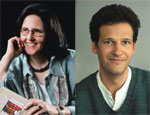Welcome to The Writer's Almanac Bookshelf, where you'll find highlighted interviews of poets heard on the show.
Maggie Anderson & David Hassler
 Q: When you started the project, what audience did you think an anthology of poetry about school experience would reach?
Q: When you started the project, what audience did you think an anthology of poetry about school experience would reach?
We wanted our anthology to speak to a wide audience of people from many different professions and interests. We envisioned that these poems would be of interest to teachers in grades K-12, college professors in education and creative writing, writers in the schools, parents, administrators and other poets. But we also believed that these poems give voice to the very American, universal experience of school and would engage a general reading audience.
Q: Did you reach the audience you thought you would, or were you surprised by who enjoyed the anthology?
We did reach a very wide audience, but we were also pleasantly surprised at some of the correspondence we received and the degree to which Learning by Heart was used in high school and college courses. We received one letter from a high school English teacher in Pennsylvania who had his students write brief essays on their favorite poems in the collection and then compose their own poems about a school experience. He mailed us his students' work, which was quite interesting and well-written.
We were also pleased to find out that Learning by Heart was adopted by the Teachers and Writers Collaborative in New York City and listed in their excellent catalog of books for teaching and writing in the schools.
Q: Has the experience of compiling this anthology had any influence on the way you approach your own writing or the classroom experience as a teacher?
We have been struck by the dramatic performance potential of the writing and have scripted many multi-voiced group poems and dramatic monologues around certain common themes. We have enjoyed performing these larger pieces at readings and using them in the many workshops we have conducted based on the book.
Though we do not feel that our own writing habits or techniques have changed significantly, we both feel grateful for the knowledge and experience we've gained from working this closely with editing and arranging such rich and diverse writing. It is the book we wanted to share with our students and to read for ourselves as a reminder of the amazing frightening, enlightening, challenging, and beautiful experience of school.
Q: Do you anticipate compiling another collection based on a common experience of life?
We have just finished compiling an anthology of short prose about school, entitled After the Bell, to be released by The University of Iowa Press in the fall of 2007. We envision this anthology as a companion volume to Learning by Heart. We are both very interested in the emerging new sub-genre of short creative nonfiction that often combines the lyric qualities of poetry with the factual details and narrative qualities of prose.
In addition to representing many of the leading prose writers in this country, After the Bell has a large number of pieces written by poets, many of whom are also in Learning by Heart. We began compiling After the Bell because we felt that there was much more to say about the school experience beyond what we had already collected in poetry.
Maggie Anderson & David Hassler's book Learning by Heart received the American Library Association's "Best of the University Presses" Award, a starred review in Publishers Weekly, and an "Editor's Choice" selection from the Chicago Tribune Book Review.
Maggie Anderson is the author of five books of poems, most recently Windfall: New and Selected Poems. She taught in schools, prisons, hospitals and senior centers from 1979-1989 and continues to conduct workshops for teachers. She currently directs the Wick Poetry Center at Kent State University and teaches in the Northeastern Ohio MFA in Creative Writing program.
David Hassler is the author of two books of poems, most recently, Red Kimono, Yellow Barn. With photographer Gary Harwood, he is the author of Growing Season: The Life of a Migrant Community, due out in September 2006. He lives with his wife and daughter in Kent, Ohio, where he is the program and outreach director for the Wick Poetry Center at Kent State University.